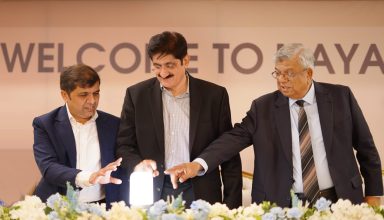Gitex in Dubai: 11-year-old students invent talking plant and solar panel that chases sun

Gitex in Dubai: 11-year-old students invent talking plant and solar panel that chases sun

A solar panel that ‘chases’ the sun, a talking planet and a staircase that converts steps into renewable energy are some of the inventions that students of the Al Mawakeb School in Khawaneej has put on show at Gitex Global 2022.
Designed by 11-year-old Daooud Alawadhi and his classmate Saeed Albusaiba, the solar panel that moved according to the position of the sun won the top prize of Dh10,000 at the tech exhibition, which has for the first time offered a platform for school students.

“I realised that many countries in the world did not have enough energy to provide electricity for its citizens,” said Daooud Alawadhi who spent several months developing the project with his teammate.
“This is a very effective way of capturing solar power and converting it into electricity or whatever power needs a country may have.”
Made with adreno kits, the prototype is designed to work in all kinds of weather conditions and can be used for domestic, industrial or commercial purposes. Daooud demonstrated the project using his phone’s flashlight.
A talking plant was also a prize winning entry. Fitted with sensors, the plant can communicate with its carers about needing water or space. Upon going close to the plant, it emits a “Keep Away” audio message through the speakers.

According to their teacher Rouzaba Nassif, the projects were all part of a science fest that the school had held for its students. “We brought 8 projects to the fair,” he said. “This is from over 100 projects that were submitted. The ideas and the prototypes that the students came up with were mind blowing. We teachers provided minimal help. Almost 90% of these projects were done by the students themselves.”
A third entry that wowed judges was the Jazy staircase that utilizes human power to generate electricity. Designed by Ziad Moussa and Jad Abou Bakr, the project fits stairs with sensors that converts people’s steps into wind energy that is then transformed into electricity. “We both have stairs at home that we use a lot every day,” said Ziad Moussa. “When we were thinking of the project, we decided to do something with that.”
The project produces renewable energy with no carbon emissions that in turn can be used to produce electricity. According to the students, the amount of energy produced will depend on the weight of the person climbing the stairs. “Not only does this project produce renewable energy, but it also gives people the incentive to take the stairs and avoid elevators,” said Jad Abou Bakr.
Another set of students, Hamad Ahli and Mahdi Romani had developed a ‘Seek Stick’ to aid blind people. The stick which had sensors could detect obstacles and alert the owner with a sound. “We want to add more features to it include a 360 degrees sensor and vibration on the handle,” said Hamad Ahli, who got the idea for the stick after seeing the struggles of grandfather.

ALSO READ:
source: khaleejtimes

